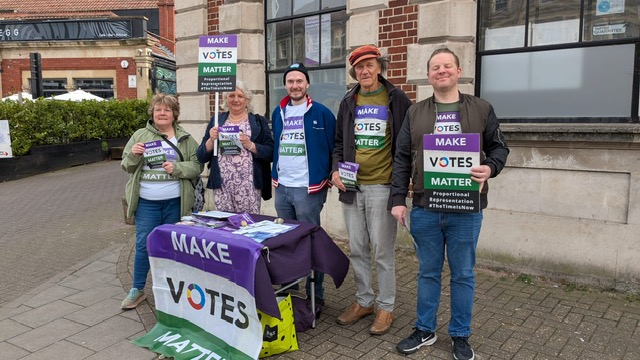
Your say / Politics
‘It should be a basic democratic principle that every vote matters equally’
Our democracy is in crisis. Poll after poll shows that trust in politics and our institutions is at rock bottom.
Participation in elections is also in decline. Only 60 per cent of people voted in last year’s General Election, marking one of the lowest turnouts in our history.
It’s no wonder people are disillusioned: in recent years we’ve been through a recession, a devastating cost of living crisis and constant political chaos which didn’t fill any of us with confidence.
is needed now More than ever
In the face of the multiple overlapping crises we face today, it is more important than ever that we have a political system that works for everyone.
At the moment Parliament doesn’t accurately represent how the country votes, and leaves millions of people unrepresented. It should be a basic democratic principle that every vote matters equally.
However, under First Past the Post, that’s not at all the case. If you live in a safe seat (and some seats in our country haven’t changed hands in over a century), your vote makes little difference.
Even in swing seats, votes cast for losing candidates are effectively wasted, and those who backed them get no representation – even if, together, they represent the majority.
In fact, 85 per cent of MPs in the current Parliament, including four out of five Bristol MPs, were supported by less than half of their constituents.
You may or may not be a Labour supporter but at the last election, the Labour Party won a landslide, despite only getting a third of the total vote.
If we take into account the low turnout, we have a government with a huge majority which only 20 per cent of the public voted for. This doesn’t sound fair to me.
It’s time to fundamentally transform the way politics is done. We need a fairer, proportional system so that all votes count.
Research has shown that proportional representation (PR) tends to produce more stable governments capable of delivering lasting improvement in complex policy areas, such as climate and healthcare.
A proportional systems encourages parties to form coalitions and cooperate, rather than just trying to game the system and win total control.
The movement to modernise democracy in the UK is building momentum, from growing pressure from local communities to PR being championed by our elected representatives in Parliament.
One of these champions is our new MP for Bristol Central Carla Denyer, who is right when she says that “we are one of the only countries left in Europe that still uses first past the post, which is incredibly out of date and unfair to voters.”
Denyer is, of course, one of just four MPs that the Green Party got, despite winning close to two million votes, as a result of a voting system that drowns out smaller parties.
Today, there are more supporters of Proportional Representation (PR) in Westminster than ever before. In December 2024, MPs made history by voting in favour of changing the voting system to a proportional one.
Although the vote was largely symbolic, it showed that the tide is starting to turn. The public is also turning against First Past the Post, with just 26 per cent of people wanting to keep the current system.
We cannot afford to wait any longer. The government must respond to the overwhelming cry for change and take the necessary steps to build a political system that works for everyone.
In Bristol, we have a thriving group of activists campaigning for PR, and we are always welcoming new members.
To join us, contact us at bristolmakevotesmatter@gmail.com. There is also lots more information about PR at makevotesmatter.org.uk.
This is an opinion piece by Judith Sluglett, a member of Make Votes Matter
If you would like to write an opinion piece to be featured on the Bristol24/7 website, please send an email to ed-team@bristol247.com
Main photo: Make Votes Matter
Read next:
 Our newsletters emailed directly to you
Our newsletters emailed directly to you



















